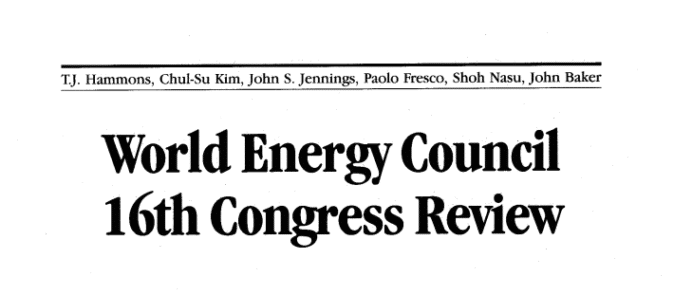This document is a review of the 16th Congress of the World Energy Council, which took place in Tokyo from October 8-13 in 1995. The World Energy Council (WEC) is comprised of a confidential group “of local and national energy companies, Government departments and organisations.” WEC was formed in 1923, and is “the UN-accredited global energy body, representing the entire energy spectrum,” serving as “the principal impartial network of leaders and practitioners promoting an affordable, stable and environmentally sensitive energy system.” The statements by Shell’s Managing Director at this conference elucidate Shell’s conflicting statements about the effects of its products on the earth’s climate.
The focus of the 16th Congress of the WEC was “on energy for our common world and what the future will ask of us.” The WEC brought a range of speakers from the manufacturing, fossil fuel, and utility industries to the World Trade Organization (WTO) and Institute for Electrical and Electronics Engineers. The group’s dissimilar ideas regarding future energy production, the scope and style of mitigatory measures, and the relative importance of nuclear energy versus fossil fuels were reflective of their sector’s best interests.
Contrasting the remarks of WTO’s Dr. Chulsu Kim and Tokyo Electric Power Company’s Shoh Nasu with those of Royal Dutch Shell Group’s Managing Director, John S. Jennings, reflects the tension between ideologies. For example, Kim emphasized the need for “greater accountability for external effects of energy use, especially on the environment,” referencing “the prospect of global warming, caused by human-induced emissions of carbon dioxide resulting from combustion of fossil fuels.” Nasu agreed, acknowledging the potential “serious harm” of climate change and the need “to seriously consider moving away from fossil fuels,” while preferring internal company policies over “relying on regulation.”
These predictions differ from Jennings’ arguments, who framed “large quantities” of fossil fuel production as “an important contribution [to sustainable development] for many years to come.” Casting doubt on the concern raised by his colleagues over climate change, Jennings maintained that “deriving maximum benefit from the world’s fossil fuel resources need not lead to anything like the extreme levels of atmospheric CO2 concentrations that some have predicted.”
Jennings also refers to “two long-term scenarios” of alternative approaches to sustainable development, presented by Shell that same year: one that values individualism and free market mechanisms and one that stresses the role of government as “the enabler of basic physical and social infrastructure.” The projections make predictions about development scenarios between 1995 and 2020, by which time even Jennings concedes that “new technologies [will] become fully competitive with conventional energy sources.” However, he still argues that “we should seek to avoid taking precipitate action to further reduce CO2 emissions,” and should “allow competitive technologies to enter the marketplace” through more capitalist principles (emphasis added).
As with many internal documents from oil and gas companies in the 1980’s and 1990’s, this document shows part of an evolving timeline of denial and skepticism among industry scientists and spokesmen. While Jennings is more skeptical than others at the WEC Congress regarding the future impacts of climate change, he still acknowledges its reality — a different tone than in his later 1997 presentation on Sustainable Development for Shell, in which he theorized that “we are still not in a position to know whether any effect will be good, bad, or indifferent, whether it will be lasting, or whether the earth’s natural processes will restore stability.” The contrast between these statements by Jennings reflects his shifting strategy in discussing climate change; Jennings concedes the impacts of climate change when among peers in the energy industry, but diminishes the issue when speaking to the public or potential critics.


